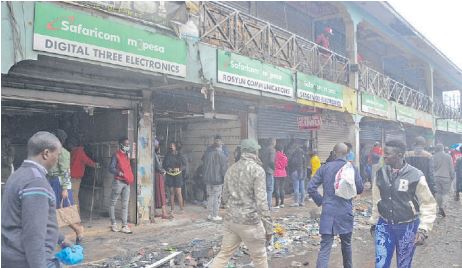Joseph Maina, a city businessman, yesterday made his way to Nairobi Central Business District in the early morning hours, as it has been his normal routine for the last 10 years.
However, it was not business as usual this time round as he reported to his business–a beauty and jewelry shop located at Imenti House facing Tom Mboya Street.
He found his shop wiped out by vandals during Wednesday’s demonstrations in the city and all that was left were gift wrappers and women stockings.
“I thank God despite the looting, I am still alive. What I am asking the government is it should protect its citizens and their investments. They are elected to serve and protect the people and when they fail, even God sees they have failed in their responsibilities. Those also breaking into businesses should put themselves in the shoes of the people they are hurting,” Maina told the Star during a spot check of the demos aftermath in the city centre.
Maina has done business in Nairobi for more than 10 years having started as a hawker before investing in a shop.
He lost wares worth more than Sh1.5 million. At Amber House which is on Hakati Road Junction, Mfangano Street, near the Bus Station, more than 15 shops were vandalised mostly electronic and mobile phone shops.
A few metres away, traders at OTC area were also counting devastating losses after their shops were looted with a building set a blaze on Wednesday, as thousands of Kenyans took to the streets to commemorate last year’s anti-finance bill protests which more than 60 people died, with at least 16 deaths reported yesterday (Amnesty Kenya) where hundreds also sustained injuries, including bullet wounds.
Another major damage was done at Mithoo House-Highlands Shopping Complex near Khoja Roundabout, where more than 50 businesses were looted as goons who capitalised on the demos had a field day.
“I had computers for sale and some brought in by clients for repairs. All is gone leaving me with nothing. Now I even have to pay my clients despite losing my business and a running loan facility,” Kennedy Gicheha, who has lost a business estimated at more than Sh500,000 said.
“These people had their sweet time as they looted shops from the ground floor all the way up. There were no police within this area…we are told they had at the time been re-deployed to the State House area leaving the Central Business District exposed,” he added.
The adjacent building also saw more than 10 shops vandalised with looters making away with mobile phones, computers, clothes, perfumes, electronic accessories among other products.
“I took a loan of Sh1.5 million to invest in this business and all has gone down the drain with a loan to pay,” Esther Wanjiru told the Star as she tried to salvage what was left behind of her mobile phone shop.
Opposite her shop, a liquor store was wiped clean with another building right opposite, towards Globe Roundabout going up in flames with shops lotted. Kevin Akhonya who runs a designer shoe shop at the Lord’s House, near Khoja-Globe Roundabout also lost his stock worth Sh1.5 million, with his shop set ablaze.
Similar scenarios were also witnessed in other major towns where supermarkets, fuel stations, retail shop, eateries and electronic shops were vandalised, as protests rocked about 27 counties among them Mombasa, Nakuru, Kisumu, Uasin Gishu, Kajiado, Makueni, Machakos, Nyeri, Embu, Nyandarua, Murang’a, Laikipia and Meru, as state mulls compensation.
The looting adds more pain to investors who last week bore the brunt of yet another protest in the city, as Kenyans called for justice for teacher and blogger Albert Ojwang’ who died in police custody on June 8, after being arrested in his Homa Bay home the day before.
Businesses are estimated to lose up to Sh3 billion in forgone sales and looting per day of protests, according to private sector players, with Nairobi taking the biggest hit. Both national and county governments also lose revenues during protests.
For instance, Nairobi, the county government which collects about Sh35 million daily in revenue has always been a casualty of demos. The county raised Sh12.8 billion in the financial year ended June 2024.
SUPPLY CHAIN DISRUPTION
The manufacturing sector also suffers as the supply chain remains disrupted during protests which hinder day-to-day operations.
The sector’s contribution to the Kenyan economy stands at about Sh1trillion as per the Economic Survey.
This translates to approximately Sh2.9 billion daily in value addition, an estimated amount lost during protests according to the Kenya Association of Manufacturers.
The Kenya Association of Manufacturers (KAM) yesterday expresses “deep concern” over the violence that accompanied the Wednesday demonstrations in some parts of the country, even as it acknowledged the constitutional right to peaceful assembly as enshrined in the Constitution.
“While some parts of the country witnessed peaceful picketing, it is regrettable that several counties experienced violence resulting in loss of life, looting, vandalism and widespread disruption of businesses and property,” CEO Tobias Alando said.
He noted that manufacturers and business entities from various regions have reported significant damages, including looting, vandalism, injury to staff, business disruptions and destruction of property.
Last week, Kenya Private Sector Alliance, private sector lobby, also expressed concern over the escalation of disregard for the rule of law, leading to the deaths of Kenyans and vandalism on businesses.
Micro, Small and Medium Enterprises Development PS Susan Mang’eni has since condemned the looting of businesses.
“The destruction of sources of livelihood is akin to depriving a business owner of their life. The MSME sector accommodates most of our workforce in Kenya. Someone today has been rendered jobless. A child tonight will miss their milk. Someone will go to bed tonight with no food on their table. Someone will struggle to pay their loan obligations. Someone tonight will not access healthcare. Someone tonight may fall into depression. The list goes on,” she said on the night of looting.

















